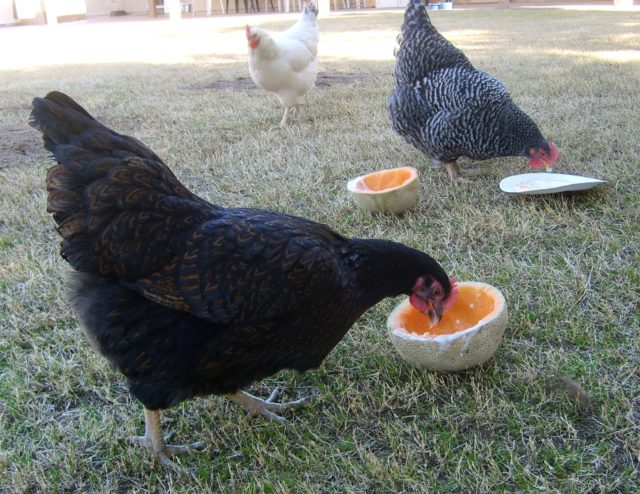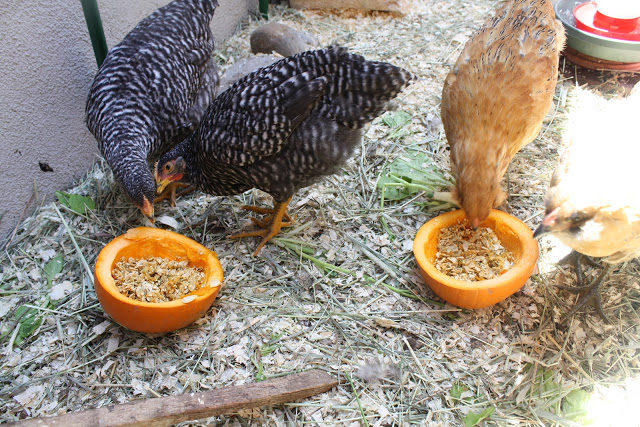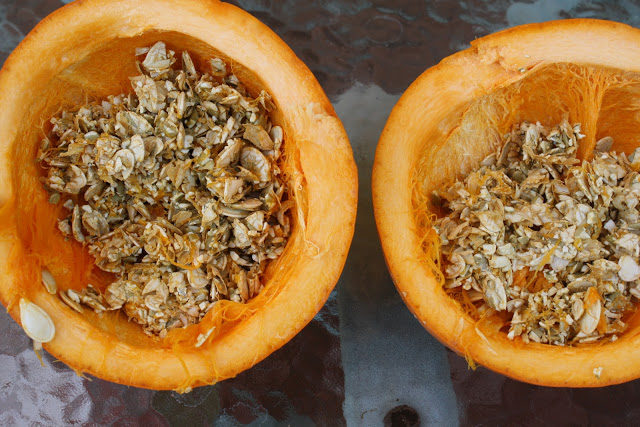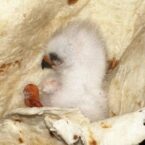Did you hear that raw pumpkin seeds are a natural de-wormer for chickens?
Elaine from Sunny Simple Life think that pumpkin seeds are a natural de-wormer for chickens because pumpkin seeds are coated in a naturally occurring chemical that paralyzes the worms so the chicken can then expel them.
She does so, but opinions are different among homesteading bloggers.
Amy from The Fewell Homestead published an article Are Pumpkin Seeds a Natural Dewormer for Chickens?” She says that it’s not a myth, but it’s only a partial truth, unfortunately.
While it is popular to suggest pumpkin and pumpkin seeds as a natural antiparasitic, it is actually the extraction of the medicinal properties in the pumpkin seeds that is a natural anti-parasitic and dewormer. You can continue to give your chickens pumpkin and pumpkin seeds, but you probably won’t get rid of a worm infestation with them, and at the very least, it’s only slightly a preventative. Your best bet is to make a tincture out of the seeds to keep on hand when you need it, or add pumpkin seeds to your homemade anti-parasitic tincture. Let’s break it down a bit more.
Healthy Chicken Treats and What Not to Give Your Flock
Giving goodies to your chickens is a great way to earn their trust and get them to love you! Most of your leftovers will be safe for your flock, but try to avoid salty foods. Also, moldy foods are toxic to chickens. Citrus is another food that should not be given to the chickens because of the acidity.
 We eat the insides of the melons and our hens are happy to get the rest….photo: mypetchicken
We eat the insides of the melons and our hens are happy to get the rest….photo: mypetchicken
Because many readers have pointed out to us that what Elaine says from Sunny Simple Life is not scientifically proven, we come back with more details.
Also guys from Leadsories checked this news and cataloged it with Fake News. We also did several checks and opinions between specialists are different. Read more in the following…
It is important for us to give you good/real informations.
Lead Stories found one scientific study into if pumpkin seeds are an effective natural de-wormer for chickens. Published in 2016, the study is titled “Evaluation of Anthelmintic Activity and Composition of Pumpkin (Cucurbita pepo L.) Seed Extracts–In Vitro and in Vivo Studies”. The research found that no benefits of pumpkin seeds in the raw form, but tests on mice using an extract from the seeds was promising:
Considering the outcomes of the presented study, the cucurbid seeds may constitute an alternative treatment for both standard and ecological methods of livestock breeding. Having in mind current demands of ecological farming, pumpkin seed extracts, classified as natural products with little chance of long-living harmful residues, can be perceived as new drug candidates, characterized by low production costs and high administration safety. Moreover, they may spawn novel agricultural industries, which will promote the cultivation of plants with antiparasitic properties to be introduced to different kinds of fodder as future medicines.
So, chickens must wait for the development of a drug made from an extract of pumpkin seeds to help rid them of worms. Raw pumpkins seeds may not hurt them, but there is no reason to believe it will help.
Another study, published in 2019, titled “Evaluation of the in vivo efficacy of pumpkin (Cucurbita pepo) seeds against gastrointestinal helminths of chickens”
The present study was conducted to evaluate the in vivo efficacy of pumpkin seeds as an alternative natural anthelmintic for chickens. Ninety Philippine Jolo native chickens of mixed sexes, aged 4–5 months and weighing 1–2 kg, were randomly distributed into three treatment groups with 30 chickens per group. Control group A was fed basic mash feed, group B received feed mixed with ground pumpkin seeds (2 g/bird per day), and group C received mebendazole medicated feed (30 mg/kg body weight). Fifteen randomly selected chickens from each group were euthanized and necropsied before treatment, and the remaining fifteen in each group were euthanized and necropsied at 3 days after the end of the treatment. Gastrointestinal worm and fecal egg counts were determined. Three genera of helminths were identified from necropsy: Ascaridia spp., Heterakis spp., and Raillietina spp. Results indicate that compared to mebendazole, pumpkin seed was moderately effective in reducing worm counts of Ascaridia spp. and Raillietina spp., marginally active in reducing worm counts of Heterakis spp., and moderately effective in reducing egg output of the worms. The results suggest that pumpkin seed has the potential to be used as an alternative anthelmintic for chickens.
Correction notice:
Our blog corrected this article because some people thought we were presenting a natural dewormer recipe for the chicken.
We changed the title, from “Raw Pumpkin Seeds as Natural Dewormer for Chickens” into “Are Pumpkin Seeds a Natural Dewormer for Chickens?”
“Did you know that raw pumpkin seeds are a natural de-wormer for chickens? I had never heard this, but always looking for a good holistic remedy, I looked into this a bit and seems a lot of people put stock in this tasty treatment. According to Elaine from Sunny Simple Life, pumpkin seeds are coated in a naturally occurring chemical that paralyzes the worms so the chicken can then expel them. What do you think?” published in May 2017
“Did you hear that raw pumpkin seeds are a natural de-wormer for chickens? Elaine from Sunny Simple Life think that pumpkin seeds are a natural de-wormer for chickens because pumpkin seeds are coated in a naturally occurring chemical that paralyzes the worms so the chicken can then expel them. She does so, but opinions are different among homesteading bloggers.” published in April 2020
We added a new opinion from The Fewell Homestead,
a scientific study “Evaluation of Anthelmintic Activity and Composition of Pumpkin (Cucurbita pepo L.) Seed Extracts–In Vitro and in Vivo Studies” published in 2016, found by Leadstories.com (a Facebook’s fact-checking partner) that says “the research found that no benefits of pumpkin seeds in the raw form, but tests on mice using an extract from the seeds was promising”
and another study published 2019 “Evaluation of the in vivo efficacy of pumpkin (Cucurbita pepo) seeds against gastrointestinal helminths of chickens” found by us that says “the results suggest that pumpkin seed has the potential to be used as an alternative anthelmintic for chickens.”
The conclusion remained the same, pumpkins seeds are not a recipe, is not a drug, we do not make recommendations. Unfortunately, some readers thought we were presenting a recipe, a drug. We apologise!




















